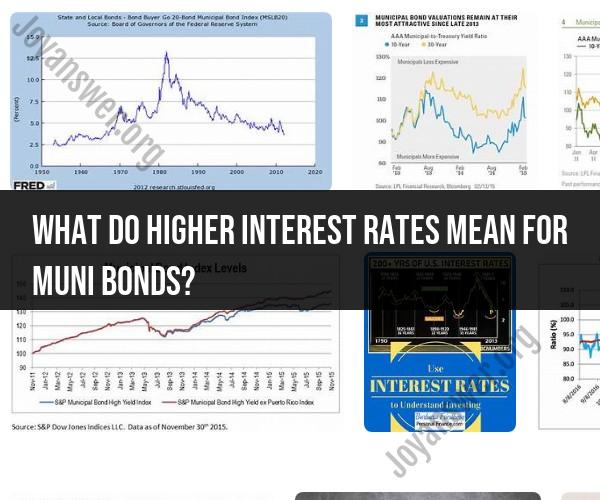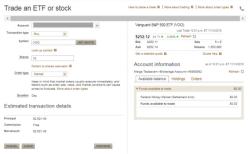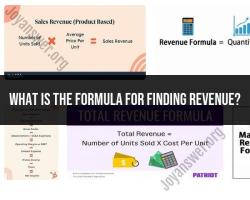What do higher interest rates mean for muni bonds?
Higher interest rates can have several impacts on municipal bonds, and the relationship between interest rates and muni bond prices is inverse. When interest rates rise, the prices of existing municipal bonds tend to fall. Here's an analysis of the impact of higher interest rates on municipal bonds:
Bond Prices Fall: One of the most significant effects of rising interest rates on municipal bonds is the decrease in their market prices. When new bonds are issued with higher coupon rates to match the prevailing interest rates, existing bonds with lower coupon rates become less attractive to investors. As a result, their prices decline to make them more competitive in the market.
Yield and Coupon Rate Spread Widens: As interest rates rise, the yield on newly issued bonds increases. Investors demand higher yields to compensate for the opportunity cost of not investing in newer bonds with more attractive coupon rates. The spread between the yield on existing municipal bonds and the yield on newly issued bonds widens, putting downward pressure on the prices of older bonds.
Interest Rate Risk: Municipal bonds are sensitive to interest rate movements, and this sensitivity is known as interest rate risk or duration risk. Bonds with longer maturities and lower coupon rates are more susceptible to interest rate risk. When rates rise, the potential for capital losses on these bonds increases, especially if they have a long time to maturity.
Income Stream Stays Intact: Despite the decrease in market prices, the income stream generated by municipal bonds remains constant. Bondholders still receive the periodic interest payments (coupon payments) and the principal repayment at maturity as long as the issuer remains financially stable.
Buying Opportunity: For investors looking to purchase municipal bonds, higher interest rates can create buying opportunities. When bond prices fall due to rising rates, investors can acquire bonds at lower prices, potentially offering higher yields compared to newly issued bonds. This can be attractive for investors seeking income.
Portfolio Diversification: Investors often include municipal bonds in their portfolios for diversification and income. When interest rates rise, the negative correlation between bond prices and stocks can make municipal bonds more appealing as a stabilizing asset class within a diversified investment portfolio.
Issuer Creditworthiness Matters: Municipal bonds are issued by state and local governments, and their creditworthiness varies. When interest rates rise, it becomes even more critical for investors to assess the financial health and creditworthiness of the bond issuer. Stronger issuers are generally better equipped to weather rising rates and maintain their bond's value.
Call Provisions: Some municipal bonds have call provisions that allow the issuer to redeem the bonds before maturity. When interest rates rise, issuers may take advantage of lower rates by calling and refinancing their existing debt, which can lead to early bond redemptions for investors.
In summary, higher interest rates tend to have a negative impact on the prices of existing municipal bonds. However, the income stream generated by these bonds remains intact, and rising rates can create buying opportunities for investors. It's essential for investors to consider their investment objectives, risk tolerance, and the creditworthiness of bond issuers when assessing the impact of higher interest rates on their municipal bond holdings. Additionally, diversification and careful bond selection can help mitigate the effects of interest rate fluctuations on a portfolio.
The Impact of Higher Interest Rates on Municipal Bonds
Municipal bonds are debt securities issued by state and local governments to finance infrastructure projects, public schools, and other essential services. They are generally considered to be safe investments, as they are backed by the full faith and credit of the issuing government. However, like all bonds, municipal bonds are subject to interest rate risk.
When interest rates rise, the prices of existing bonds fall. This is because investors can buy new bonds with higher yields, making older bonds with lower yields less attractive. As a result, investors who sell existing bonds when interest rates rise may lose money.
Understanding the Effects of Rising Interest Rates on Muni Bonds
The effect of rising interest rates on municipal bonds depends on a number of factors, including:
- Bond maturity: Longer-term bonds are more sensitive to interest rate changes than shorter-term bonds. This is because investors who hold longer-term bonds will have to wait longer to receive their principal back, and they are therefore more exposed to interest rate risk.
- Bond quality: Bonds with higher credit ratings are generally less sensitive to interest rate changes than bonds with lower credit ratings. This is because investors are more confident that high-quality bonds will be repaid on time, even if interest rates rise.
- Market conditions: The overall market environment can also play a role in determining how municipal bond prices react to rising interest rates. In a strong economy, investors may be more willing to take on risk, which can support municipal bond prices. However, in a weak economy, investors may be more risk-averse, which can lead to a sell-off of municipal bonds.
Navigating Municipal Bond Investments in a Changing Interest Rate Environment
There are a few things that investors can do to navigate municipal bond investments in a changing interest rate environment:
- Invest in a diversified portfolio of bonds: By investing in a variety of bonds with different maturities and credit ratings, investors can reduce their risk exposure.
- Consider shorter-term bonds: Shorter-term bonds are less sensitive to interest rate changes, so they may be a good option for investors who are concerned about rising interest rates.
- Invest in high-quality bonds: Bonds with higher credit ratings are generally less sensitive to interest rate changes, so they may be a good option for investors who are looking for lower-risk investments.
- Work with a financial advisor: A financial advisor can help investors develop a bond investment strategy that meets their individual needs and risk tolerance.
Overall, the impact of higher interest rates on municipal bonds depends on a number of factors. Investors should carefully consider their risk tolerance and investment goals before making any decisions about their bond portfolio.












